- tel +39 02 2399 3338
- manuela.galli@polimi.it
- English
- Italiano
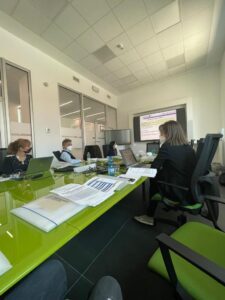
The TRIALS project aims to identify the most suitable technology to manage the rehabilitation program to patients with different needs and to apply a personalized respiratory and / or motor rehabilitation program at home to a group of post-covid patients, after discharge in order to evaluate its effects.
The project partnership consisting of the Politecnico di Milano – Polo Territoriale di Lecco (leader for Italy, project coordinator), Clinica Hildebrand – Brissago Rehabilitation Center (leader for Switzerland) and Istituto Auxologico Italiano, intends to provide, through the study of new systems for remote rehabilitation, solutions to assist health facilities in managing the demand for rehabilitation in the area using a remote “digital” therapist.
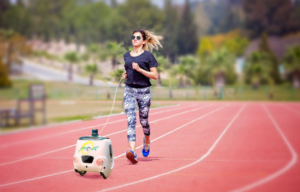
BUDD-e (Blind-assistive aUtonomous Droid Device) promotes a fair recovery by targeting blind and visually impaired people. In particular, an autonomous guiding robot prototype will be created and inclusive and user-centered architectural design concepts will be developed and applied to support a renewed accessibility to services and public spaces by these subjects.
BUDD-e was proposed by a team coordinated by Marcello Farina of the DEIB and by Emanuele Lettieri of the Department of Management Engineering. Luca Bascetta, Matteo Corno and Manuela Galli from DEIB, Giuseppe Andreoni and Paolo Perego from the Design Department and Andrea Rebecchi from the Department of Architecture, Construction Engineering and Built Environment also collaborate on the project.
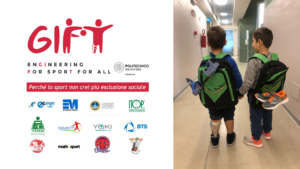
GIFT wants to promote the possibility of a “Sport For All”, with the aim of improving the quality of life of children diagnosed with hemiplegia attending primary school, who are not given the same sporting opportunities offered to normal children. The school environment and the hours of physical education, from a “gym of life”, thus risk becoming a context of exclusion. The first objective of the project is therefore to raise awareness in schools on disability and sport, in order to promote greater teacher preparation for the needs of a child with disabilities, as well as fostering an easier relationship between school and family and a better knowledge of the risks and benefits of physical activity in disability. The second objective is of a technological nature and aims to improve the involvement of these children in sports activities, at school as well as in leisure, through the development of new-generation orthoses.
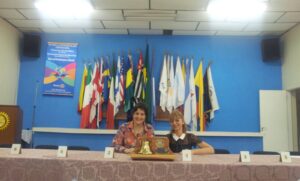 This project was supported by the Rotary Foundation in collaboration with the Rotary Club Cidade de Rio Claro Azul (BR) and the Italian Rotary Club. The main objectives of the AMA project – “Analysis of the Accessible Movement for All” is to offer advanced tools for the rehabilitation of people with motor disabilities (especially children and young people)and to ensure excellent training for rehabilitation workers working in the area. The chosen center is that of the Children’s Habilitation Center Princesa Victoria (CHI-PV) in the city of Rio Claro, State of São Paulo, Brazil. Inside the centre, a movement analysis laboratory has been created, equipped with the most modern technologies for the quantitative evaluation of movement.
This project was supported by the Rotary Foundation in collaboration with the Rotary Club Cidade de Rio Claro Azul (BR) and the Italian Rotary Club. The main objectives of the AMA project – “Analysis of the Accessible Movement for All” is to offer advanced tools for the rehabilitation of people with motor disabilities (especially children and young people)and to ensure excellent training for rehabilitation workers working in the area. The chosen center is that of the Children’s Habilitation Center Princesa Victoria (CHI-PV) in the city of Rio Claro, State of São Paulo, Brazil. Inside the centre, a movement analysis laboratory has been created, equipped with the most modern technologies for the quantitative evaluation of movement.
The project “Oncological pathology and long survivals: Quantitative evaluation of limbs affected by lymphedema and their recovery following targeted rehabilitative treatments ” was the winner of the “Polisocial Awards 2012-2013” promoted by Fondazione Cariplo. Polisocia Awards that aims to promote and support projects that have a strong social impact. The main partners were: the Politecnico di Milano and the Fondazione IRCCS Istituto Nazionale dei Tumori di Milano. The project is part of the oncological rehabilitation and in particular aims to provide the clinic with tools and methodologies to help in the assessment of functional limitation following breast cancer. Every year, about 40,000 women suffer from this cancer (20-25% of cancers afflicting women). The life expectancy of patients suffering from this form of cancer is progressively increased both thanks to effective prevention programs, both by the improvement of surgical techniques used and for that of specific pharmacological treatments. Unfortunately, the main side effect of demolitive surgery (which usually involves the removal of the lymphatic stations of the axillary cavity) is the appearance of lymphedema ( stagnation of interstitial fluid due to the interruption of the lymphatic tracts of the affected limb). This condition leads to an increase in the volume of the entire limb. The result is a functional limitation that has repercussions both in the psychological, social and work that contribute to the reduction of the quality of life of these patients. The aim of this project is to provide technological tools, methods and protocols for the evaluation of the functional limitation associated with this volume increase. A quantitative measure of this limitation leads to better measure the gravitation of lymphedema, monitor its progress over time and better define the therapies and treatments useful for its reduction or containment.
The TUTORI INNOVATIVI DI ARTO INFERIORE project is a project of industrial research and experimental development in the strategic sectors of the Lombardy Region and the Ministry of Education, of the University and Research funded in 2011 which has as its objective the study of new composite and polymeric materials for the development of orthoses/ lower limb tutors lighter, more durable and durable in terms of product life and higher performance. Orthoses are generally used in the case of functional deficits in the lower limbs and their fundamental characteristic is to ensure alignment with the corresponding articular segments; in fact they are exoskeletons, because they approximate the movement of the joints. Their function is exactly to support the patient in the path, by unloading part of his weight on the brace, allowing a proper muscle activation in order to optimize the walk. The partners of this project are Roadrunnerfoot Engineering srl (Leader), Politecnico di Milano, Centro Ortopedico Essedì and Lamar srl.
The NICE Project (New Italian Chilean Excellence) 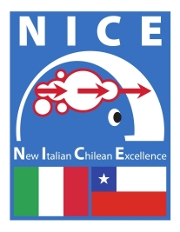 is a project funded by the Lombardy Region in 2010 with the aim of developing specific protocols for the evaluation of movement and brain activity associated with it in the execution of movements typical of daily life in children with disabilities, especially in children with cerebral palsy. These protocols, applied before and after rehabilitative treatment, will allow to verify objectively and quantitatively the effectiveness of rehabilitative treatments normally used in children with disabilities.
is a project funded by the Lombardy Region in 2010 with the aim of developing specific protocols for the evaluation of movement and brain activity associated with it in the execution of movements typical of daily life in children with disabilities, especially in children with cerebral palsy. These protocols, applied before and after rehabilitative treatment, will allow to verify objectively and quantitatively the effectiveness of rehabilitative treatments normally used in children with disabilities.
The partners of this project are the Department of Bioengineering of the Politecnico di Milano, which is the Coordinator of the NICE project, and the Universidad de Chile.
The Department of Bioengineering of the Politecnico di Milano has long had extensive experience in the quantitative evaluation of movement for clinical-rehabilitative application (Laboratory of Analysis of Posture and Movement “Luigi Prohibition”) and the evaluation of signals related to brain activity (Laboratory of Processing of signals, data and images biomedical).
The Universidad de Chile, with its clinical partner Infatile Teleton Rebilitation Center in Santiago, have a lot of experience in the field of pediatric evaluation and treatment. In particular, the Teleton Rehabilitation Center is the largest child rehabilitation center in Chile with a catchment area of about 10,000 patients a year.
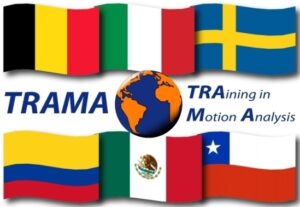
The analysis of human posture and movement is a sector in strong expansion and growing interest in the clinical field; it allows the definition of a subject’s motor strategy in a quantitative and non-invasive way and to provide clinicians with relevant information for the assessment of the patient.
Project TRAMA has as main objective the training of researchers in the field of quantitative analysis of the movement in order to create a network of collaborations between the institutions involved in the project.
Goals
The objectives of this project are:
Project TRAMA is one of the projects of the Alpha Programme (Latin America – Formacion Academica), a cooperation programme between Europe and Latin America in the field of university education.